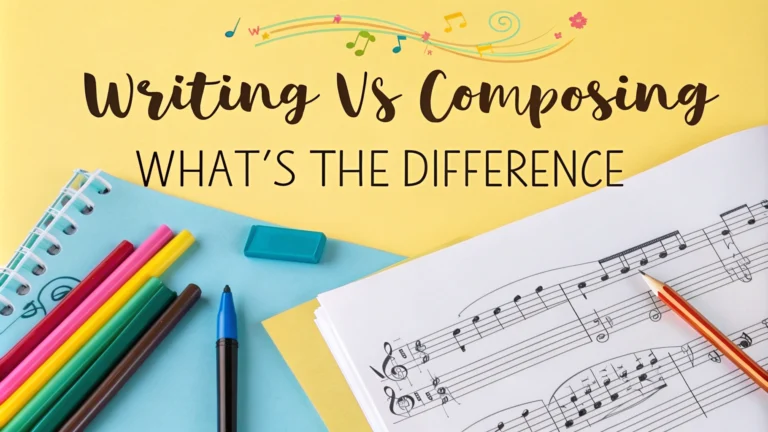**Writing** and **composing** may seem interchangeable, but they represent distinct creative processes with unique characteristics and purposes. Understanding these differences helps create better content and improve your creative workflow.
Whether you’re a **content creator**, **author**, or **student**, knowing when to apply writing versus composing techniques can enhance your work quality and efficiency. This quick guide breaks down the key distinctions and shows you how to leverage both skills effectively.
Core Differences Between Writing and Composing
**Writing** focuses on putting thoughts into words, while **composing** involves structuring and arranging ideas into a cohesive whole. Think of writing as creating individual building blocks, and composing as architecting the entire structure.
- Writing emphasizes: Word choice, grammar, flow
- Composing emphasizes: Structure, organization, overall impact
When to Write vs When to Compose
Certain projects benefit more from a writing-first approach, while others require composition skills from the start.
| Writing-First Tasks | Composition-First Tasks |
|---|---|
| Blog posts | Research papers |
| Journal entries | Novels |
| Social media posts | Academic theses |
Essential Tools and Techniques
Each approach requires different tools and mindsets to maximize effectiveness.
- Writing tools: Word processors, note-taking apps, writing prompts
- Composing tools: Outline software, mind mapping tools, structure templates
“Good writing is clear thinking made visible.” – Bill Wheeler
Developing Your Skills in Both Areas
Mastering both **writing** and **composing** takes focused practice and the right learning approach. Start with small projects that let you build confidence in each skill separately.
- Practice free writing for 15 minutes daily
- Create basic outlines for short articles
- Join writing groups for feedback
- Study successful content structures
Common Mistakes and How to Avoid Them
Understanding typical pitfalls helps prevent common errors in both **writing** and **composing** processes.
| Writing Mistakes | Solutions |
|---|---|
| Overcomplicating sentences | Keep sentences under 20 words |
| Weak transitions | Use connector phrases |
| Poor paragraph flow | Create topic sentences |
Combining Writing and Composing Effectively
The best content emerges when **writing** and **composing** work together seamlessly. Start with a solid outline, then let creative writing fill in the details.
- Begin with rough outlines
- Write sections in modular blocks
- Revise for flow and coherence
- Polish individual sentences last
“The first draft is just you telling yourself the story.” – Terry Pratchett
Moving Forward with Both Skills
Set specific goals for improving both your **writing** and **composing** abilities. Track your progress through completed projects and feedback.
Action Steps:
- Create a monthly writing calendar
- Build a portfolio of different content types
- Set measurable improvement goals
- Request regular peer reviews
Remember that improvement comes through consistent practice and thoughtful analysis of your work. Focus on one skill at a time while maintaining awareness of how they complement each other.
Writing vs Composing FAQs
General FAQs
Q: What is the main difference between writing and composing?
A: Writing typically refers to creating written content like stories or articles, while composing traditionally refers to creating musical pieces or formal literary works with specific structural elements.
Q: Can someone be both a writer and composer?
A: Yes, many professionals work in both fields. Songwriters, for example, compose music while writing lyrics, effectively combining both skills.
Q: Which process requires more formal training?
A: Musical composition typically requires more formal training in theory, harmony, and musical structure. Writing can be self-taught more easily, though formal education is beneficial.
Long-tail Keyword FAQs
Q: What software do I need for composing vs writing?
A:
• Writing: Word processors (Microsoft Word, Google Docs)
• Composing: Music notation software (Sibelius, Finale) or DAWs (Logic Pro, Pro Tools)
Q: How much do professional composers make vs writers?
A: Average annual salaries in the US:
| Profession | Salary Range |
|---|---|
| Writers | $35,000 – $90,000 |
| Composers | $40,000 – $120,000 |
Q: Is composing music harder than writing books?
A: Each requires different skill sets. Music composition needs technical knowledge of music theory and instrumentation, while book writing requires strong language skills and narrative development.
Q: What’s the difference between composing an email vs writing an email?
A: “Composing” an email suggests a more formal, structured approach, while “writing” an email is the more common, casual term. The actual process is the same.
Q: Do composers write or compose lyrics?
A: Technically, lyrics are written, not composed. Composers create the musical elements, while lyricists write the words. Some professionals do both.
Q: What’s the difference between composing poetry vs writing poetry?
A: These terms are often used interchangeably for poetry. “Composing” poetry might emphasize the structural and rhythmic elements, while “writing” poetry is the more common term.
Q: How long does it take to learn composing vs writing?
A: Basic writing skills can be developed in 1-2 years, while musical composition typically requires 3-5 years of dedicated study to master fundamental concepts.
Q: Can AI compose music and write stories?
A: Yes, AI can generate both written content and musical compositions, though human creativity and emotional depth remain superior in both fields.



















